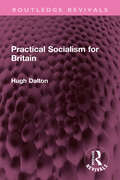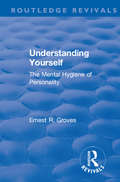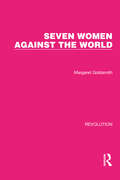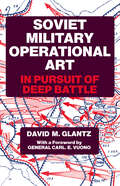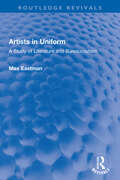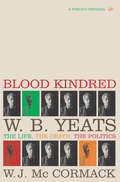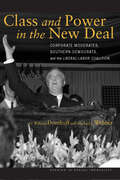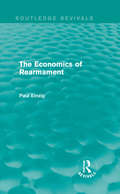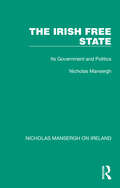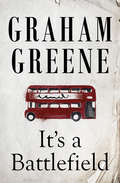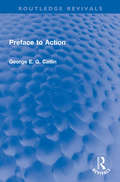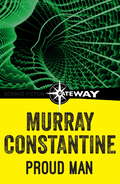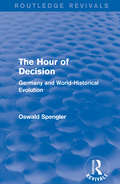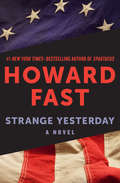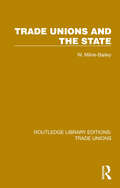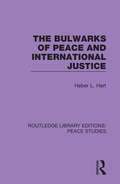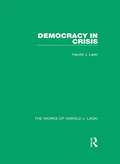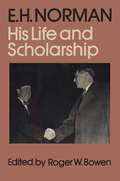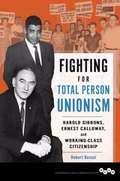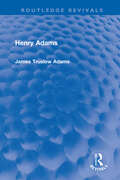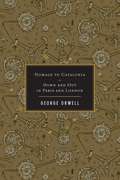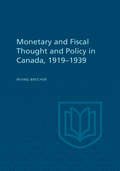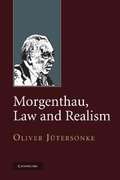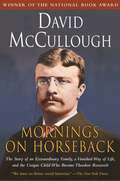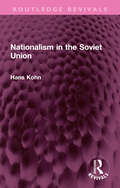- Table View
- List View
Practical Socialism for Britain (Routledge Revivals)
by Hugh DaltonFirst published in 1935, Practical Socialism for Britain presents an assessment of the Labour government’s policy options and aggressively advocates for socialism Britain’s panacea. Citing apathy and panic-mongering as the greatest enemies of the Labour Party, the author asserts that the Labour Party can restore meaning and sincerity to politics by bringing about tangible development and eliminating the militarisation of politics. He also exhorts the Crown and the civil services to be politically neutral and pledge allegiance to the Constitution. Strictly anti-fascist and anti-communist, this book will be of interest to students of history, political science, and government.
Revival: Understanding Yourself: The Mental Hygiene Of Personality (1935) (Routledge Revivals)
by Ernest R. GrovesThis book has a practical purpose. It seeks to help the reader to understand himself and his problems, that he may increase his successes, his fruit, and his satisfactions. The discussion centers about the conditions that shape personality, but the attempt of the book is not to rehearse the findings and theories of science but to provide the means by which the reader can come to a better understanding of himself.
Seven Women Against the World (Routledge Library Editions: Revolution #29)
by Margaret GoldsmithThis book, first published in 1935, examines the lives of seven revolutionary women: Charlotte Corday, Théroigne de Méricourt, Flora Tristan, Louise Michel, Vera Figner, Emma Goldman and Rosa Luxemburg. The revolutionary impulses of these remarkable women emerge as the natural result of the historical associations of their age, but the author concludes that some sacrifices were made in vain because there was no strong revolutionary movement behind them. This book is a key analysis of the reasons behind the revolt of these women against their systems of society, and why some of them thought it worth while to die if necessary for the principles in which they believed.
Soviet Military Operational Art: In Pursuit of Deep Battle (Soviet (Russian) Military Theory and Practice)
by Colonel David GlantzDavid Glantz examines the Soviet study of war, the re-emergence of the operation level and its connection with deep battle, the evolution of the Soviet theory of operations in depth before 1941, and its refinement and application in the European theatre and the Far East between 1941 and 1945.
Artists in Uniform: A Study of Literature and Bureaucratism (Routledge Revivals)
by Max EastmanFirst published in 1934, Artists in Uniform confronts what the author describes as ‘two of the worst features of the Soviet experiment’ following Lenin’s death – bigotry and bureaucratism – and shows how they have functioned in the sphere of arts and letters. It is divided into three parts: The Artist’s International; A Literary Inquisition; and Art and the Marxian Philosophy.
Blood Kindred: W. B. Yeats, the Life, the Death, the Politics
by W J McCormackIn June 1934, W. B. Yeats gratefully received the award of a Goethe-Plakette from Oberburgermeister Krebs, four months after his early play The Countess Cathleen had been produced in Frankfurt by SS Untersturmfuhrer Bethge. Four years later, the poet publicly commended Nazi legislation before leaving Dublin to die in southern France. These hitherto neglected, isolated and scandalous details stand at the heart of this reflective study of Yeats's life, his attitudes towards death, and his politics.Blood Kindred identifies an obsession with family as the link connecting Yeats's late engagement with fascism to his Irish Victorian origins in suburban Dublin and industrializing Ulster. It carefully documents and analyses his involvement with both Maud Gonne and her daughter Iseult, his secretive consultations with Irish army officers during his Senate years, his incidental anti-Semitism, and his approval of the right-wing royalist group L'Action Française in the 1920s. The familiar peaks and troughs of Irish history, such as the 1916 Rising and the death of Parnell, are re-oriented within a radical new interpretation of Yeats's life and thought, his poetry and plays. As far as possible Bill McCormack lets Yeats speak for himself through generous quotation from his newly accessible correspondence. The result is a combative, entertaining biography which allows Ireland's greatest literary figure to be seen in the round for the first time.
Class and Power in the New Deal: Corporate Moderates, Southern Democrats, and the Liberal-Labor Coalition
by G. William Domhoff Michael J. WebberClass and Power in the New Deal provides a new perspective on the origins and implementation of the three most important policies that emerged during the New Deal--the Agricultural Adjustment Act, the National Labor Relations Act, and the Social Security Act. It reveals how Northern corporate moderates, representing some of the largest fortunes and biggest companies of that era, proposed all three major initiatives and explores why there were no viable alternatives put forward by the opposition. More generally, this book analyzes the seeming paradox of policy support and political opposition. The authors seek to demonstrate the superiority of class dominance theory over other perspectives-historical institutionalism, Marxism, and protest-disruption theory-in explaining the origins and development of these three policy initiatives. Domhoff and Webber draw on extensive new archival research to develop a fresh interpretation of this seminal period of American government and social policy development.
The Economics of Rearmament (Routledge Revivals)
by Paul EinzigFirst published in 1934, this book explores prominent economic questions on the subject of rearmament and disarmament. Both rearmament and disarmament have a number of economic advantages and disadvantages and in each chapter Paul Einzig considers these in order to decide on which side the advantages outweigh the disadvantages. Part I of the book examines the economics of armament in the light of real experience of recent history whilst Part II looks to the probable economic effort of future rearmament.
The Irish Free State: Its Government and Politics
by Nicholas ManserghOriginally published in 1936, this book provides an accurate and critical analysis of government in the Irish Free State, its principles, structure, philosophy and direction. It discusses clearly and impartially not only the failure of the Treaty settlement but also the electoral system, the legislature, the increase of executive power and the growth of administrative law and justice.
It's a Battlefield: Orient Express, It's A Battlefield, And A Gun For Sale (Twentieth Century Classics Ser.)
by Graham GreeneAn “adventurous . . . intelligent . . . ingenious” novel of crime and punishment in pre–World War II London (V. S. Pritchett). During a demonstration in Hyde Park, Communist bus driver Jim Drover acts on instinct to protect his wife by stabbing to death the policeman set to strike her down. Sentenced to hang—whether as a martyr, tool, or murderer—Drover accepts his lot, unaware that the ramifications for the crime, and the battle for his reprieve, are inflaming political unrest in an increasingly divided city. But Drover’s single, impulsive act is also upending the lives of the people he loves and trusts. Caught in a quicksand of desperation, sexual betrayal, and guilt, they will not only play a part in Drover’s fate, but they’ll become agents—both unwitting and calculated—of their own fates as well. Turning the traditional narrative of the police procedural, domestic drama, and political thriller on its head, It’s a Battlefield was described by Graham Greene himself as “a panoramic novel of London,” one without heroes and villains, only “the injustice of man’s justice.”
Preface to Action (Routledge Revivals)
by George E. CatlinFirst published in 1934, Preface to Action was written to provoke thought on society and its structure and to enable readers to make a considered judgement at election, particularly those with less time to make their decision. The book discusses the conflict between wanting to make an informed political decision, and not having the time or all the information to do so. In light of this, Catlin brings together what he considers useful points to help guide readers towards a decision. He outlines his personal opinions and explains his reasons for them. Divided into three parts, the book first explores psychology and considers what institutional forms would best satisfy what he identifies as the major human instincts or impulses. The second part considers the community, whether it is state or nation, and what the best form of it is. The third part is a detailed exploration of the religions of Catholicism, Toryism, Fascism, and Communism. Preface to Action will be of great appeal to those with an interest in twentieth century British and European history, the history of politics, the history of political thought, and political psychology.
Proud Man (Gateway Essentials #527)
by Murray ConstantineOriginally published in England in 1934, this searing, still timely novel offers and incisive critique of the sexual politics and militarism of England, and the West as a whole.Proud Man is told from the perspective of a "Genuine Person" who has been thrown back in time thousands of years from a peaceful future society. The Genuine Person comes from a people that are androgynous, self-fertilizing, and vegetarian; they live without a national government and artificial social divisions of gender and class. Taking on first female, then male form, the "Genuine Person" confronts the deeply troubled reality of England in the 1930s, still battered after one World War and on the road to another.
Routledge Revivals: Germany and World-Historical Evolution (Routledge Revivals)
by Oswald SpenglerFirst published in 1934, the majority of this book was developed just prior to the Nazi seizure of power, with additional material which reflects on its aftermath. It assessed the decline of European power and the crisis of Western civilization in the face of conflict between the ruling class and the lower classes, arguing that only by adherence to their inherited ‘Prussianism’ would Germany have the solidity to be able to combat these dangers. Despite the influence of his previous writings on key Nazi figures, his criticisms of National Socialism led to the book being banned, although not before it had been widely distributed throughout Germany. This work will be of interest to students of 20th century German and European history.
Strange Yesterday: A Novel
by Howard FastFast&’s epic novel, about one man&’s family tree stretching through history from the Revolutionary War, portrays the best and worst of the American experiment Broken and sick, a young Revolutionary War soldier from New York is taken in by an innkeeper&’s family and nursed to health. The soldier, John Preswick, falls in love with the innkeeper&’s daughter, even as his wife Inez waits back home. Through five generations, the two families he starts share an intertwined fate. The Preswicks take part in some of the country&’s most significant episodes, from the Civil War to the California Gold Rush, with fortunes discovered, lost, and made on the backs of others. A tenacious chronicler of American history, Howard Fast was one of the most prolific historical novelists of the twentieth century. Strange Yesterday is perhaps his most sweeping, ambitious novel. This ebook features an illustrated biography of Howard Fast including rare photos from the author&’s estate.
Trade Unions and the State (Routledge Library Editions: Trade Unions #4)
by W. Milne-BaileyOriginally published in 1934, Trade Unions and the State is a study of political institutions. This is a lucid account of the diverse views that have been held about the nature, attributes, functions and prerogatives of the State. The book analyses the changing status and treatment of Trade Unions under the law of the UK during the early part of the 20th century.
The Bulwarks of Peace and International Justice (Routledge Library Editions: Peace Studies)
by Heber L. HartOriginally published in 1918, this book is a primer of the principles of peace. The author urges that the Pact of Locarno involves a risk graver than this country ought to sustain. He attempts to demonstrate that the only effective method of providing against future wars is a covenant for mutual assistance, to an agreed extent, in maintaining peace under the League of Nations, conditional upon the disarmament of each Power down to the limit of the forces necessary for the fulfilment of this covenant and for the purposes of internal order.
Democracy in Crisis (The Works of Harold J. Laski)
by Harold J. LaskiThis volume is an expanded version of the Weil lectures given at the University of North Carolina in 1931 and is one of the two texts of Laski’s quasi Marxist period.
E.H. Norman: His Life and Scholarship
by Roger W. BowenThe ashes of Herbert Norman now lie in the British cemetery at Rome, near those of Shelley and Keats. His distinguished life and tragic death, in April 1957, are recalled and examined in this book by scholars and diplomats from four countries--the United States, Japan, Canada, and Britain.Born in rural Japan the son of a Canadian missionary, Herbert Norman studied at the University of Toronto and went in 1933 to Cambridge University on a scholarship. There, in that intellectual hothouse where it seemed one had to choose politically between communism and fascism as the future of the West, he joined the Communist party--a move that became a crime later in the fixed and 'sightless' (as the editor describes them) eyes of his American accusers.According to Edwin Reischauer, later the US ambassador to Japan, 'his harassment by the American government was unforgiveable.' His suicide in Cairo, while Canadian ambassador to Nasser's Egypt during and after the delicate times of the Suez Crisis and the establishment of the UN peace-keeping force, raised broader questions for Lester Pearson--'the right, to say nothing of the propriety, of a foreign government to intervene' in Canadian affairs.Norman was also a renowned historian of Japan. His Japan's Emergence as a Modern State has been called a classic, and between 1946 and 1950, as head of the Canadian Liaison Mission in Tokyo, he was a close and friendly adviser to General Douglas MacArthur in his efforts to reconstitute that country. Both this work and his writings on Japan were sympathetic to human freedoms and democracy, and they too became controversial as sides congealed in the Cold War. Five papers in this book assess Norman's scholarly work in the historiography of Japan.Four lecture papers by Norman (three previously unpublished) are included which show his change from 'a doctrinaire Marxist to a Jeffersonian Liberal,' a change historians can accept as fact whereas intelligence agencies could not and remade Norman into a communist. He was not a spy, the editor concludes, and should be remembered as the hero of a modern tragedy.
Fighting for Total Person Unionism: Harold Gibbons, Ernest Calloway, and Working-Class Citizenship
by Robert BusselDuring the 1950s and 1960s, labor leaders Harold Gibbons and Ernest Calloway championed a new kind of labor movement that regarded workers as "total persons" interested in both workplace affairs and the exercise of effective citizenship in their communities. Working through Teamsters Local 688 and viewing the city of St. Louis as their laboratory, this remarkable interracial duo forged a dynamic political alliance that placed their "citizen members" on the front lines of epic battles for urban revitalization, improved public services, and the advancement of racial and economic justice. Parallel to their political partnership, Gibbons functioned as a top Teamsters Union leader and Calloway as an influential figure in St. Louis's civil rights movement. Their pioneering efforts not only altered St. Louis's social and political landscape but also raised fundamental questions about the fate of the post-industrial city, the meaning of citizenship, and the role of unions in shaping American democracy.
Henry Adams (Routledge Revivals)
by James Truslow AdamsThis book, first published in 1933, examines the life and achievements of Henry Adams, the American historian and political journalist. It looks at his youth and early development of his ideas, and goes on to look at his time as a diplomat, historian and journalist – and his impact upon American political and intellectual life.
Homage to Catalonia / Down and Out in Paris and London
by George OrwellHomage to Catalonia is both a memoir of Orwell's experience at the front in the Spanish Civil War and a tribute to those who died in what he called a fight for common decency. Down and Out in Paris and London chronicles the adventures of a penniless British writer who finds himself rapidly descending into the seedy heart of two great European cities. This edition brings together two powerful works from one of the finest writers of the twentieth century.
Monetary and Fiscal Thought and Policy in Canada, 1919-1939
by Irving BrecherIn this careful and thorough study of a Canadian field which has been relatively untouched in recent years, Dr. Brecher records and comments on the development of monetary and fiscal thinking in Canada in the inter-war period, and its impact on public policy in the federal sphere. Examining Canadian opinion about economic theory during this time, the author draws on four fields of thought: that of government and other public officials; of businessmen, such as bankers, and their views on what should be done about the depression; of the "radical group", such as those prominent in the formation of the CCF and Social Credit parties; and of economists, prominent in the universities.Dr. Brecher points out in his preface that his inquiry is rooted in the conviction that the problems associated with cyclical fluctuations remain sufficiently complex to make an understanding of the developments of the twenties and thirties an indispensable condition for effective stabilization policy. He finds the twenties distinguished only in the superficial and imperfect diagnosis of and remedial suggestions for unemployment, made chiefly by a relatively small handful of thinkers associated with the Progressive and United Farmers movements, then emerging in the West. It was the thirties which, under the impact of the depression, witnessed the first real stirrings of careful economic analysis in cyclical terms, and of statistical techniques for measuring the value of annual productive activity and income receipts in the Dominion.The author has attempted to appraise the evolution of the Canadian policy of monetary and fiscal stabilization within the thought environment in which it was conceived and implemented, and on the basis of the standards set by modern income-employment theory.
Morgenthau, Law and Realism
by Oliver JütersonkeAlthough widely regarded as the 'founding father' of realism in International Relations, this book argues that Hans J. Morgenthau's legal background has largely been neglected in discussions of his place in the 'canon' of IR theory. Morgenthau was a legal scholar of German-Jewish origins who arrived in the United States in 1938. He went on to become a distinguished professor of Political Science and a prominent public intellectual. Rather than locate Morgenthau's intellectual heritage in the German tradition of Realpolitik, this book demonstrates how many of his central ideas and concepts stem from European and American legal debates of the 1920s and 30s. This is an ambitious attempt to recast the debate on Morgenthau and will appeal to IR scholars interested in the history of realism as well as international lawyers engaged in debates regarding the relationship between law and politics, and the history of international law.
Mornings on Horseback: The Story of an Extraordinary Family, a Vanished Way of Life and the Unique Child Who Became Theodore Roosevelt
by David McculloughThe National Book Award-winning biography that tells the story of how young Teddy Roosevelt transformed himself from a sickly boy into the vigorous man who would become a war hero and ultimately president of the United States, told by master historian David McCullough.Mornings on Horseback is the brilliant biography of the young Theodore Roosevelt. Hailed as "a masterpiece" (John A. Gable, Newsday), it is the winner of the Los Angeles Times 1981 Book Prize for Biography and the National Book Award for Biography. <P><P>Written by David McCullough, the author of Truman, this is the story of a remarkable little boy, seriously handicapped by recurrent and almost fatal asthma attacks, and his struggle to manhood: an amazing metamorphosis seen in the context of the very uncommon household in which he was raised. The father is the first Theodore Roosevelt, a figure of unbounded energy, enormously attractive and selfless, a god in the eyes of his small, frail namesake. <P><P>The mother, Mittie Bulloch Roosevelt, is a Southerner and a celebrated beauty, but also considerably more, which the book makes clear as never before. There are sisters Anna and Corinne, brother Elliott (who becomes the father of Eleanor Roosevelt), and the lovely, tragic Alice Lee, TR's first love. All are brought to life to make "a beautifully told story, filled with fresh detail" (The New York Times Book Review). A book to be read on many levels, it is at once an enthralling story, a brilliant social history and a work of important scholarship which does away with several old myths and breaks entirely new ground. It is a book about life intensely lived, about family love and loyalty, about grief and courage, about "blessed" mornings on horseback beneath the wide blue skies of the Badlands scholarship, which does away with several old myths and breaks entirely new ground. <P><P> For the first time, for example, Roosevelt's asthma is examined closely, drawing on information gleaned from private Roosevelt family papers and in light of present-day knowledge of the disease and its psychosomatic aspects. At heart it is a book about life intensely lived...about family love and family loyalty...about courtship and childbirth and death, fathers and sons...about winter on the Nile in the grand manner and Harvard College...about gutter politics in washrooms and the tumultuous Republican Convention of 1884...about grizzly bears, grief and courage, and "blessed" mornings on horseback at Oyster Bay or beneath the limitless skies of the Badlands. "Black care rarely sits behind a rider whose pace is fast enough," Roosevelt once wrote. It is the key to his life and to much that is so memorable in this magnificent book.
Nationalism in the Soviet Union (Routledge Revivals)
by Hans KohnFirst published in 1933, Nationalism in the Soviet Union aims at presenting the mentality of the Soviet citizen, of the Communist ‘theology,’ and the way in which it tried to make its peace with the ‘theology’ of nationalism that dominated the world. The author uses the term ‘theology’ intentionally for he argues that both the Soviet Union and the Western civilization are based on the same idea: the secularization of the Biblical faith in world history as a single comprehensive conception; their methods, however, are radically different. The Soviet Union’s understanding and use of nationalism provides deep insight into the nature of nationalism while proving the well-known truth that the emotional appeal of nationalism overrides all other forms of loyalties. Both a personal account and a political note, this book will be of interest to students of political science, international relations, history, geography, and philosophy.
